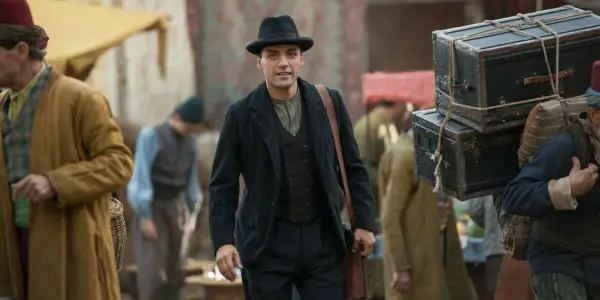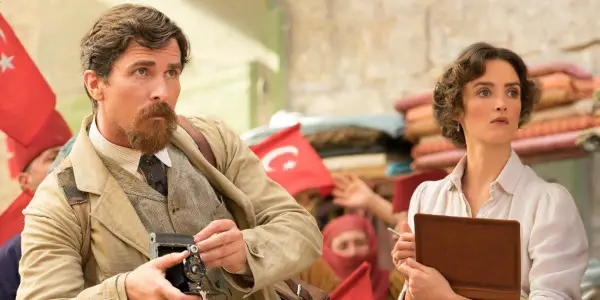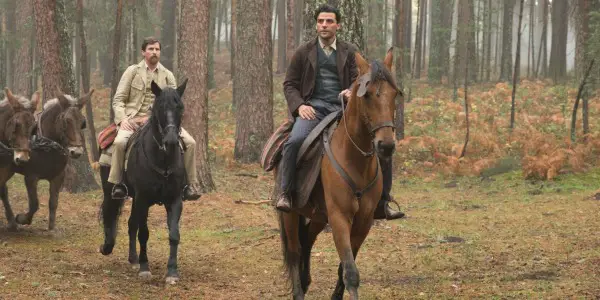THE PROMISE: Plagued By Commitment Issues

Alex is a film addict, TV aficionado, and book lover.…
It’s not often that a movie tells a new story, but The Promise illuminates one long shrouded by political pressure. Turkey, the successor state to the Ottoman Empire, refuses to recognize the killing of 1.5 million Armenians by the Ottoman government during World War I as a genocide, and in an effort to maintain good relations, several governments have carefully sidestepped the term as well. The fraught political climate means the event hasn’t been as widely discussed as other modern genocides, and remarkably, The Promise marks the first time that a mainstream American film has depicted it.
But before you start congratulating Hollywood, understand that Hollywood didn’t make this film. The $100 million production was independently financed by former MGM owner Kirk Kerkorian, an Armenian American whose parents left the Ottoman Empire as the genocide started. Basically, without a wealthy man with personal connections, there wouldn’t be this film, its star-studded red carpets, or its celebrity twitter pledges.
Those pledges may seem frivolous at first glance, but The Promise has faced some very real backlash online, where its IMDB page received over 57,000 one-star votes after three screenings at TIFF. Simple math proves that all those votes didn’t come from actual viewers, and the assumption seems to be that the very real Armenian Genocide deniers are tracking this film.
As for me, I guarantee that I’m a real person who saw The Promise, who heard people murmuring about how this film taught them something as they exited the theater, but can’t rightfully endorse this unbalanced attempt at a romantic epic.
A Distressing But Impersonal Tragedy
Depicting a genocide sets you up with some riveting material. It may not make for the most comfortable sit, but seeing loss and destruction gets audiences deeply invested, pulling them along even when they may prefer to look away. The Promise admirably doesn’t bludgeon you with tragedy, but there’s plenty of tough material to support its two-plus hour run time.

The film begins with Oscar Isaac’s Mikael leaving his village to attend medical school in Constantinople. Even with war looming, the energy of the city makes his life seem rosier than ever, particularly when he befriends the charming Ana (Charlotte Le Bon). Never mind that she’s got an American journalist boyfriend (Christian Bale) or that Mikael is betrothed to another woman; when sparks fly, they fly.
Just as the love triangle starts to simmer over, war and the accompanying genocide break out, and the film attempts to grow into a sweeping tale like the war romances of old. But the movie doesn’t balance its chess pieces properly, separating or entirely leaving out characters long enough to mute their emotional connections. With the personal story faltering and the wider tragedy being kept at arms length, the film winds through a series of dark turns that keep your attention but never quite hit their mark. Yes, it’s upsetting to see a genocide unfold (I’m not a monster), but each moment plays more like vague outrage than the personal tragedy it’s aiming for.
Motivation Needed
There will always be a certain scrappiness to films like this, where events unfold on a scale much larger than the individual characters can possible understand or fight against. They, and to a certain extent, the plot, should sway and bash against obstacles as they come up, but their pin-balling needs a clear destination or at least a buoy to cling to.

Director and co-writer Terry George tries to position the love triangle as our through line, which is understandable considering interpersonal motivation worked well in his previous genocide film, Hotel Rwanda. Remember how effective the last hotel attack sequence was in that film, when Don Cheadle’s Paul is separated from his family? The tension isn’t broken when the army shows up and stops the attack. No, it lifts when Paul throws back the shower curtain to reveal his family survived, albeit more by luck than their foolproof shower hose defense. Survival was the battle, but making it out together was the war.
Perhaps that’s a subtle difference, but the latter carries with it a more tangible hope for the future. The audience knows precisely what Paul needs for his life to be happy, and we panic along with him when those needs are threatened. There’s no such palpable desire in The Promise, as thin characterization is overwhelmed by surrounding circumstance.
Mikael wants to be a doctor? That goes without mention for a large chunk of the film. Bale’s Chris has an incorrigible mouth? Only when in the boozy luxury of Constantinople. Ana flip-flops, too, but her desires mostly stem from the men around her, and that’s kind of the crux of the film. The problem isn’t that the characters are wishy-washy; the problem is that they adapt too quickly, seemingly clinging to nothing except survival. That’s admittedly an important goal, but it’s not one that allows for a fully satisfying ending.
Legendary Inspirations, Lesser Accomplishments
The film unabashedly styles itself as a war romance, trying for the beauty of Casablanca but faltering under inferior shot construction and editing. Unfortunately, this is especially prevalent in the film’s first act, where a poorly sequenced travel montage undercuts the excitement of Mikael arriving in Constantinople. With a bad taste in your mouth right off the bat, the generally underwhelming technical aspects compound to make the film feel drab, even as it dangles emotional beats in front of you.

Isaac, Le Bon, and Bale do their best with the material given to them, and they occasionally pull off touching, personal moments. Isaac in particular, when allowed to seethe with rage, is able to bring the film’s dueling sense of scale into focus, so the larger ramifications of the genocide are felt through Mikael’s personal experiences. But just as often, the film veers too far into delicately staged melodrama, and the perfectly timed tears ring false.
Some viewers will likely forgive The Promise’s unsavory aspects and find those tears moving. The film does, after all, take its cues from some of the best classic cinema, but by drawing comparisons to those greats, its few successes seem particularly dim.
Conclusion
The Promise has lofty aspirations and a flimsy base, proving too thin and drab to be truly gripping. There’s small things to enjoy here, and in accordance with the film’s good intentions, all proceeds from its theatrical run will go to charity. Things like that make it tempting to give The Promise a pass, but a story about genocide shouldn’t be this forgettable.
What is your favorite romantic epic? Let us know in the comments below!
The Promise was released in the U.S. on April 21st and will be released in the U.K. on April 28th. For all international release dates, see here.
Does content like this matter to you?
Become a Member and support film journalism. Unlock access to all of Film Inquiry`s great articles. Join a community of like-minded readers who are passionate about cinema - get access to our private members Network, give back to independent filmmakers, and more.
Alex is a film addict, TV aficionado, and book lover. He's perfecting his cat dad energy.













